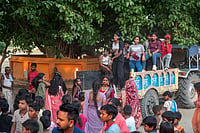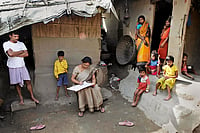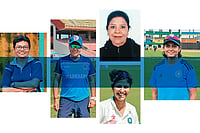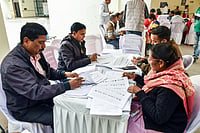When a 27-year-old tribal took away a carpet, two chairs and two lamps from his house to start a library, his mother was not at all happy. She said, “These are the only two chairs in our home. If there are some guests around, where do you think they will sit?” To this, the son had replied, “The place I am taking these chairs to, needs them the most.”
The statement made by his mother 15 years ago on October 2, 2008, is still fresh in the memories of Sanjay Kachhap. This very day, he along with some of his friends had started this library near his paternal home, at some distance from Palhatu Tola, in the tribal dominant district of Chaibasa. The library was named Kudakh. The library which had a humble beginning at the community hall with a carpet and lamps, has not transformed into a digital library. Now, the place is equipped with an inverter, 6 computers, wifi internet, LED, and projector, and has become a treasure of close to five thousand old and new books.
After almost one and half decades of continuous efforts, the library has become a model for other villages in different districts of Kolhan division of Jharkhand. These libraries have been opened in different regions of the state. Today, Sanjay Kachhap who leads this campaign is being addressed as a Library man. Kachhap gained popularity across the country last year on November 27, 2022, when the Prime Minister spoke highly of Sanjay Kachhap for his efforts and how the library has played an essential role in making books available for the poverty-stricken tribal areas of the country. 43-year-old Kachhap says that for his tribal locality, the library was an alien world altogether. Today it has become a common word for them. Under the guidance of Kudakh Library, there are half a dozen study centres in operation at the nearby localities. Kudhak Library at Barkandaz Toli, Kathik Oraon Library at Kumhar Toli, Mary Tola Library, Nadipaar Library and Maskaal Library Kamarhatu are some libraries.
Outlook has tried to find the story behind this journey. Sanjay Kachhap currently works as a Panan Secretary at Dumka Agricultural Production Committee. He is the eldest of two brothers and a sister in his family. While he was studying his father worked as a labourer and mother worked as house help. Sanjay says, “I belong to a locality where the place and the adjoining areas are referred as slums. During the 90s, the houses in the locality used to sell traditional liquor or rice beer. Children were not sent to school as their fathers used to work as labourers or were drunkards. They were so much addicted to drinking that by the time they reached 40 to 45 years of age, they died. Women worked as house help or sold beer. It was a common sight to see people fighting or abusing others when drunk. The environment at home was not conducive to studies. I used to be very upset watching these incidents and could not figure out a way to change the system.”
After passing metric exam in the year 1996, Sanjay tried to improve the situation of the place by opening an evening primary school. However, since this step did not garner support from the locals, the school had to be shut down within a year.
He started group study with some of his friends for a general competitive examination in 1999 but could not find any place to do the same. He says, “We used to visit a friend’s place or the other for study purposes. The place kept on changing. We used to collect money from different sources to buy magazines. 25 of us continued our studies in this fashion for four continuous years. I was the first one to get a job in group D of the railways department. I took a room on rent in 2005. In the year 2006, I cleared the exam for railway guard and qualified GPSC in 2008. The same year, a library got opened in Pulhatu.” According to Sanjay, this process continued till 2010, till every member of his group job a job.
There is a long list of tribal slum dwellers who have taken the support of Kudak Library to find a suitable jobs for themselves. Ajay Kachhap, Ranjeet Oraon, Sanjay Nima, Manjeet Kachhap, Ravi Toppo, Karma Kachhap, Sishir Bopai, Vinay Kujur, Vishwanath Kujur, Ramesh Kachhap, Ritesh Tigga, Bhola Tirky, Manoj Khalko are some names whose families were either into the sale of rice beers or whose parents worked as labourers to run their households. As such they were unable to provide education to their children. The adjoining areas were not very supportive of education either.
41-year-old Bhola Tirky’s family had been engaged in selling rice beer. He used to help his family members in this work. His father was a drunkard. He was diagnosed with liver cirrhosis and died in 2003. While talking to Outlook he says, “After my father’s demise, problems increased manifolds. My family was very poor. Whatever sale proceeds were received from rice beer, it was used to run the household. All those people who came for rice beer were offered food for Rs. 20. The atmosphere in my house was not conducive for study. Those who came to drink used to create a ruckus. The situation used to be so bad that I could not disclose the same to my friends. My afternoons were spent in selling rice beer and evenings in the library. I wanted to be financially independent as soon as possible by getting a job so that we did not have to sell rice beer for our survival.”
Bhola Tirky has been one of the founding members of the Kudak Library. His house is at Mary Tola which is half a kilometre away from the library. He is working as an account audit officer at CAG, Raipur, Chattisgarh. He gives credit to the library for his success. He says that had there been no library, people like him would not have reached the place they have right now. Bhola has five sisters and two brothers. He says that as soon as he secured a job he stopped the sale of rice beer at his place. He got his sister married and later he too got married.
Similarly, 39-year-old Manoj Khalko’s family was also engaged in selling rice beer. His house is at Mochi Sai Tola of Chaibasa district from where the library is a kilometre away. Manoj had also done his preparations at the same library and is now working as a manager of the Indian Overseas Bank at Chaibasa. He says, “Apart from running the household, my family did not have enough money to buy books and copies for us. Our family was big in size. We are three brothers and three sisters. Since there was no job, we had to sell rice beer. However, I had made up my mind that the future generation would not be engaged in the sale of rice beer.”
Bhola Tirky and Manoj Khalko stopped the sale of rice beer in their households as soon as they got their respective jobs. They are of the view that there have been lots of changes in their localities. The households that were engaged in selling rice beer have stopped the same. They feel that education is the only alternative to selling rice beer.
The state Finance Minister, Rameshwar Oran, is all praises for the libraries being opened in the different districts of Jharkhand by Sanjay Kachhap. He had felicitated Sanjay in one of the programmes too. Rameshwar Oran was an IPS officer before entering politics. Speaking to Outlook he says, “I had never ever bought any book to study or went to any coaching institute. It is because of the library that I have become an IPS officer. A person does not become intelligent only by obtaining a degree. I always feel that library plays a pertinent role in shaping the intelligence of an individual. Libraries need to be opened in villages and towns to spread knowledge and awareness among all. Sanjay Kachhap is doing a wonderful job in this regard.”
Several naxal-affected villages too are a part of the library campaign started in the different districts of Jharkhand by Sanjay Kachhap. A library got opened in a closed Government primary school of a tribal village Saharbeda of Kharsava Block of Sarai Kharsava district in 2019. 29-year-old Dharmendra Oran who looks after the operation of this library is preparing for the different competitive exams. He says, “It is due to this library that four people have got recruited in Government jobs and the confirmation of the other five is in process. There has been a huge change in the village. Earlier, no one wanted to discuss education and studies. Children have started realizing the importance of studies in their lives because of this library. Kids used to secure only 60 to 65% marks in the metric examination. Those who have never joined tuition classes are able to secure 80 to 85 per cent in their exams now only on account of studying at schools and libraries. We have built a chain system for studies. Students of 8th grade teach grade 6 students and senior students teach children of classes 8 to 10. Apart from books, the other facilities available at the library are the inverter, four computers, LED and projector. There are around 60 students who visit the library daily.”
Dharmendra says that the village has been affected by the Naxalites and there is an elephant menace too. The same problem grips the Redingada village of Kharsawa block. A library has been opened in March 2020 to curb this menace. 23-year-old Laxman Hembrom says that children who used to wander aimlessly after their schools have now found a new purpose in life through this library. 50 to 60 children visit this library to study. The village is surrounded by forest and people sell the leaves and wood of the area for their livelihoods. These people cannot afford to pay the private tuition fees of their children. The library has come as a great support for these people. Gram Sabha welcomed Sanjay Kachhap and fully supported his efforts of opening a library here. An old dilapidated government building has been made available for the said purpose.”
(This story was translated from Hindi to English by Kaveri Mishra.)



























